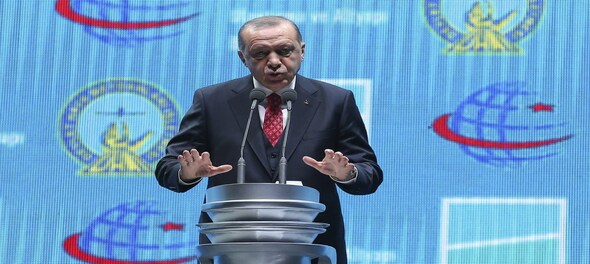
Turkey’s President Recep Tayyip Erdoğan is on an official visit to Pakistan. It is the first head of a state visit by a foreign leader to Pakistan in 2020. A landmark deal for dual citizenship between Pakistan and Turkey has been signed. Both countries have spoken in glowing terms about the significance of this visit and about bilateral ties. Erdogan who arrived in Islamabad with a big business delegation was warmly received by the Pakistanis on their arrival in Islamabad.
The tone of the visit was set in an article titled 'You Have us, Pakistan’ in the Turkish pro-government daily Daily Sabah by renowned Turkish journalist Hakki Ocal. He writes 'On top of the long-established brotherhood between the two nations (Turkey and Pakistan), Pakistan has been let down by its traditional allies during the recent crisis in Kashmir...'
No doubt this pertains to Pakistani Prime Minister Imran Khan's frustration with the OIC, and most specifically with its Arab allies like Saudi Arabia which has refused to allow any meetings on Kashmir. The issue of Kashmir was of course raised during Erdogan's address to the joint session of the Pakistan Parliament – something Erdogan did for the fourth time – twice as Prime Minster earlier and now a second time as President of Turkey, becoming the only foreign dignitary to do so. Erdogan has now expended sufficient effort in taking up the Kashmir cause, speaking about it in the UN General Assembly, hosting a conference on it in October last year, and repeatedly offering to mediate between India and Pakistan. The Turkish media has kept up a steady tirade against India after the reorganisation of Jammu & Kashmir.
But why has Turkey been so vociferous on Kashmir when things had just begun looking up for bilateral ties with India?
Both Pakistan and Turkey are bonded by a common nostalgia for empire – Pakistan for the Muslim rule on the Indian subcontinent and Turkey for the Ottoman Empire. Both see themselves as legatees of these legacies. The Pakistani state sees itself as the successor to the millennia-old Muslim rule in the Indian subcontinent, especially the Mughal Empire, something that has shaped the country’s approach to security and its military.
Anyone who follows Turkish policies will know that under Erdogan Turkey has been steadily Islamising and it has been trying to position itself as leader of the Muslims; throwing in his support for the Muslim Brotherhood Turkey has been injecting itself in the affairs of the Arab world, the Turkic world, and in South Asia.
Thus just as Pakistan harps on Kashmir and wages proxy war there, Turkey under Erdogan became the conduit for the foreign fighter from across the world to the now destroyed ISIS caliphate in parts of Syria and Iraq.
It came as no surprise, then, that in his address to the joint session of the Pakistani parliament Erdogan invoked Mahmud of Ghazni, the Ghaznavid rule, the Mughals, the Khilafat movement, thereby injecting Turkic inheritance in bilateral relations and expanding the geography of Turkic history and memory. Of course, Erdogan predictably made references to Kashmir and said it would also stand by Pakistan in the Financial Action Task Force (FATF), the global terrorist-financing watchdog, due to meet this month. Turkey has helped Pakistan avoid being blacklisted by FATF until now.
However, attempts to romanticise relations between Turkey and Pakistan, calling it a relationship between 'heart to heart', masks more pragmatic concerns.
As Turkey throws down the gauntlet to the traditional Arab-led Muslim world and the Organisation of the Islamic Conference, it will be looking to countries like non-Arab but populous Muslim countries like Pakistan for support.
It was to this end that Turkey, Pakistan, and Malaysia had convened a separate Islamic summit in Kuala Lumpur last December but Saudi Arabia put a spanner in the works for Pakistan by restraining its participation in the summit which it sees as an attempt to divide the Muslim ummah and challenge Saudi leadership of the OIC. It was to assuage feelings and placate both Malaysia and Turkey that Prime Minister Imran Khan visited Malaysia soon after, and is currently hosting Erdogan.
"Erdoganism" also demands strong military power as Turkey intervenes militarily in resource-rich places like Northeastern Syria and Libya. While the Arab world has condemned these interventions, Pakistan has endorsed them and expressed support and understanding for Turkey’s move.
From this flows the strong military ties that both Pakistan and Turkey enjoy, and which have significantly increased in the last couple of years. As Turkey’s ties with the US and NATO get complicated, Turkey may look to military support from countries like Pakistan. Analysts also gauge that Turkey may have other calculations from Pakistan – nuclear weapons. Turkey has been seeking nuclear weapons since the 1960s, and though it is a signatory to the nuclear non-proliferation treaty (NPT) Erdogan has not made it secret that he does not accept any constraints imposed on Turkey by nuclear powers. In this regard, Pakistan automatically becomes important to any plans that Turkey may have of going nuclear. Pakistan is the only known Muslim country with nuclear weapons, providing a nuclear umbrella to other countries. It also has a track record of nuclear proliferation and Turkey was a hub for rogue Pakistani nuclear scientist Abdul Qadeer Khan.
First Published: Feb 15, 2020 9:28 AM IST
Check out our in-depth Market Coverage, Business News & get real-time Stock Market Updates on CNBC-TV18. Also, Watch our channels CNBC-TV18, CNBC Awaaz and CNBC Bajar Live on-the-go!


View | Congress manifesto vs BJP's wealth redistribution narrative — is it something out of nothing
May 2, 2024 9:10 AM
Two days left for filing nomination, Congress undecided on candidates for Amethi and Rae Bareli seats
May 2, 2024 7:32 AM
Lok Sabha polls: Polling time in Telangana increased by an hour, here's why
May 2, 2024 6:55 AM

